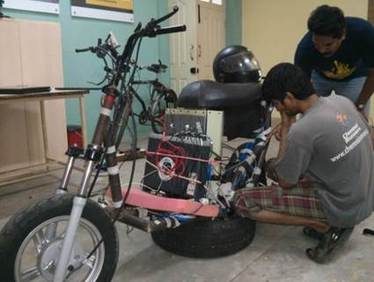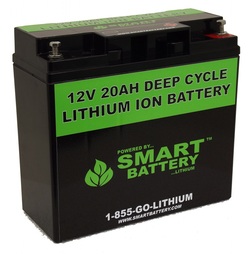Lets face it, most e-bikes that are sold in India are under powered, take 7-8 hours to charge, use unreliable lead acid batteries and have not sold well and thus have not made a dent in the Indian two wheeler market.
All of this is about to change. There is hope for the Indian two wheeler industry to have an electric future.
 Swapnil Jain and Tarun Mehta - Founders of Ather Energy
Swapnil Jain and Tarun Mehta - Founders of Ather Energy
He says - "Most of the current generation e-bikes are using obsolete technology which have reached a stagnant state and no further development is possible in them. The top speed they provide is not suitable for most people. We have seen the best that these technologies can provide us they don't live up-to our expectations."
Mr Swapnil and his friend Mr Tarun Mehta founded Ather Energy to solve this problem of providing an e-bike (electric scooter), that is both compelling and affordable to the Indian public. Both of them graduated from IIT Madras, belonging to a specific stream called Engineering Design - which bridges the gap between various engineering fields and is focused towards realizing a product.
The Ather team consists of innovative engineers having experience in Formula SAE, passionate industrial designers and intelligent electronics engineers from various parts of the country. All of them share a passion for automobiles.
Ather Energy was founded in October 2013, but work on the product began early that year.
 Team at Ather Energy working on the next generation e-bike
Team at Ather Energy working on the next generation e-bike
Mr Swapnil says - "The product is being designed to be practical and perform on part with other gasoline scooters in the market. Our product uses emerging technologies in terms of cell chemistry, motor and controller technology which are in the middle of S curve of development and will see steep improvements in future. This will help us provide better products as we proceed. Even at the current state these technologies perform far better than the current e-bikes technologies."
The point made by Mr Swapnil about emerging technologies, is significant. These technologies are available in the market now, but are expected to develop significantly in the coming years. So it makes sense to adopt technologies which are on the upward curve.
 E-Bikes + Lithium Ion Batteries = Future
E-Bikes + Lithium Ion Batteries = Future
Currently e-bikes sold in India use the Sealed or Valve Regulated Lead Acid batteries. These are better than the old plain lead acid, as they don't need to be topped with distilled water in regular intervals and are maintenance free. They are cheap but the biggest problem is that these battery packs cant store as much energy as the new generation Lithium Ion packs. Most E-Bike manufactures store 1kWh worth of energy in the battery packs within their e-bikes. Just to get a perspective, the Mahindra e2o electric car stores 10kWh worth of energy. 1kWh is sufficient for an e-bike. But the chemistry of the lead acid battery is a problem. They are heavy, they have lesser charge cycles (which will mean replacement of battery sooner than a customer would like), they take forever to charge (7-8 hours on a 230 V, 15 Am socket)
So its imperative that any new e-bike should go for a non lead acid based battery pack (say Lithium Ion) in order to deliver decent power, go further and satisfy customers.
Mr Swapnil talks about spending time on technology and processes before launching a product - "At Ather we believe that any product which was not designed under one roof cannot deliver the best and hence we are designing most of the components in house with a high level of synergy between them. This will help us deliver a better product. A simple analogy is Mac vs Windows PC. The tighter control you have on development, the better you focus on the vision and hence better the product is. Its a tough task but its the only way to go forward if you want a good product."
This is another interesting point. Automobile manufacturers have been repeating the same policies for years. They tend to buy existing parts from third-party manufacturers, instead of designing or building their own. This is one reason why vehicles have lacked originality for decades.
Designing and manufacturing your own parts enables you to innovate by building the parts around your new and improved designs. In other words, you can’t improve cars/bikes unless you come up with a new design yourself. Also, this allows Ather to implement both quality and cost controls effectively. This is definitely the way to go. And am glad Ather energy are sticking to their convictions.
Now we do know that Lithium-Ion battery packs are expensive. A pack with 1kWh worth of energy currently costs around $500, which is around Rs 31,000. This is just the battery pack. Most Indian consumers expect the bike to cost that much!
Mr Swapil gives his view on an affordable e-bike - "Affordable is a subjective matter, in a total cost of ownership basis our product will be much cheaper than any gasoline scooter but you pay some cost upfront. Any technology is affordable if it receives mass adoption, with enough buyers one day even space travel will be affordable. Before mass adoption its the early adopters who push the technology forward, our current product is targeted for early adopters. We dont want to disappoint early adopters on any front hence the product is meant to be a premium product, a product which makes them feel happy about their decision. We believe within half a decade the technology will surpass the current gasoline prices."
The most important take is the overall ownership cost. This is something people always ignore. Electric vehicles offer significant savings when you take the total ownership costs into consideration.
|
Contact
Ather Energy IIT Madras incubation cell, 3rd Floor, IIT Madras Research Park 1, Kanagam Road, Tharamani Chennai, Tamil Nadu 600113, India [email protected] [email protected] Mobile: +91 99520 93 37 Website - http://atherenergy.com/ |
|
